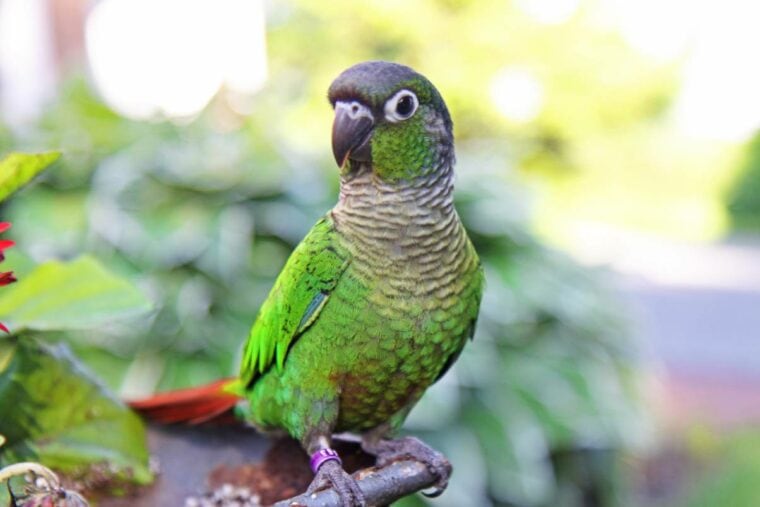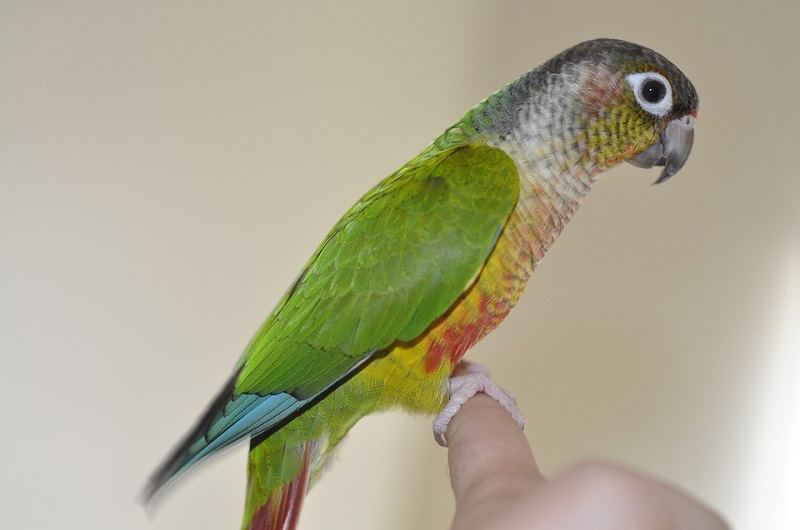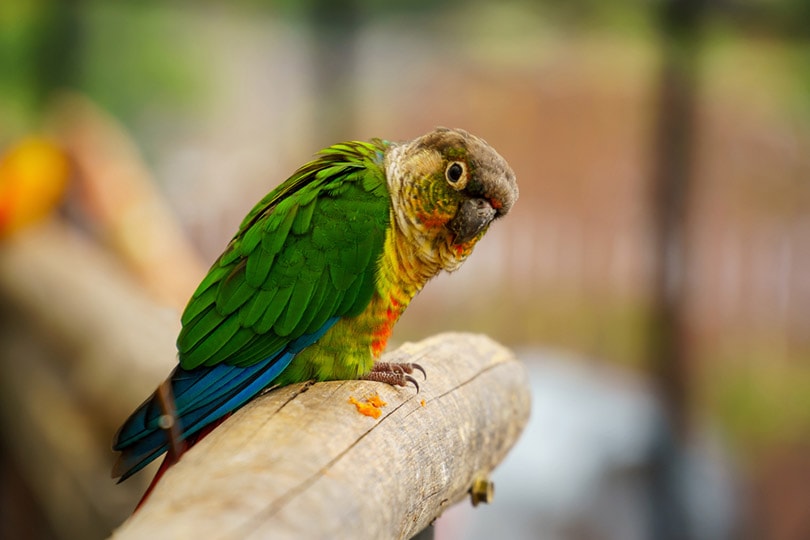
Click to Skip Ahead
This article has been fact-checked by a qualified veterinarian using information available at the time of review. Knowledge of parrot husbandry is continually evolving. The views and opinions expressed in this article are those of the author.
The green-cheeked conure (Pyrrhura molinae), sometimes called the green-cheeked Parakeet, is a wonderful companion bird boasting high intelligence and a larger-than-life personality. As with many species of birds popular in aviculture, green-cheeked conures can have long lifespans, living as long as 25 to 30 years if properly cared for. However, most have much shorter lifespans than expected due primarily to poor husbandry. Read on to learn more about green-cheeked conures’ lifespan, including what you need to do to help yours live a long and healthy life.
Green-Cheeked Conures Average Lifespan
Green-cheeked conures in captivity typically live anywhere between 10 and 25 years. This huge lifespan range is largely dependent on the environment their caretakers provide and the care the birds receive. Green-cheeked conures can live up to 25 years or more if they’re looked after well and fed a nutritious and balanced diet. Those who live on the shorter end of that spectrum often pass early due to suboptimal care.

How Long Do Green-Cheeked Conures Live in the Wild?
Green-cheeked conures live in the forests of South America, in places like northeastern Bolivia, western Paraguay, and Brazil. They live in tall trees. at altitude. Because they’re mostly green, they have great camouflage skills that can protect them from predators like false vampire bats and ornate hawk-eagles. Green-cheeked conures living in the wild have much the same lifespan as those cared for properly in captivity, typically between 25 and 30 years.
How to Care for Your Green-Cheeked Conure for a Long Lifespan
1. Feeding & Diet
Poor nutrition is a common reason many pet birds fall ill and pass early, so providing the proper diet is paramount. Species-specific commercially prepared pellets are the recommended diet for all pet birds. These pellets have been developed to meet your conure’s specific nutritional needs. Additionally, vegetables and fruits should be offered daily but make up no more than 20% to 30% of your bird’s daily caloric intake. Seed based diets should be avoided due to the high fat and low calcium and vitamin A content.

2. Environment
Pet green-cheeked conures need a clean, warm, and mentally stimulating environment free from drafts and potentially toxic fumes. It’s best to place your pet’s cage in a family-centered room where they can feel part of the flock, but kitchens aren’t the best place as they can be very dangerous (read on to find out more).
Many cages on the market are made of poor-quality or toxic materials, so opt for stainless steel if your budget allows it. If not, powder-coated metal cages are an okay second option. The bigger the cage you can provide, the happier your bird will be. Please pay close attention to the bar spacing as your conure shouldn’t be able to get their head through and wedged between the bars. The best cage has a combination of vertical and horizontal bars to help your green-cheeked conures get around easily.
Your green-cheeked conures will need a variety of toys to stay physically and mentally stimulated. Parrots are destructive little things, so the more toys you have, the better. Additionally, you should switch out your conure’s toys weekly as they’ll tire of their toys if they’re not swapped out regularly. You can also DIY toys from items you likely already have in your home. Make sure the toys are safe for your bird; swallowing bits of string or soft plastic leads to gastrointestinal foreign bodies.
3. Care
If possible, we highly recommend researching avian care well before you bring your green-cheeked conure home. Birds have unique care requirements and are sensitive to many things around the home, so the more informed you are about potential hazards, the longer your bird will live.
Take Teflon poisoning, for example. Many of us cook with non-stick pans, but did you know that they can emit extremely hazardous fumes if heated to very high temperatures? It’s true, and according to the Pet Poison Helpline, Teflon toxicity is one of the most common reasons for poisoning in birds.
It’s not just Teflon you have to worry about, though. Even seemingly innocuous things like fumes from new furniture, air fresheners, and hair spray can be harmful when in close proximity to your pet bird.

4. Cleaning
As mentioned above, green-cheeked conures are very sensitive to their environment, so you need to be careful when cleaning their space. Common household cleaning products can be harmful for your pet, so use bird-safe options such as apple cider vinegar diluted with water at a 1:1 ratio, plain dish soap or a bird-safe cleaner instead.
You might also consider investing in a HEPA air filter to keep the air your conure breathes clean and safe.
5. Healthcare
As with all pets, your green-cheeked conures should see their avian veterinarian at least once a year for a wellness exam. Newly acquired birds should see a vet within the first few days after adoption to ensure they’re not carrying any contagious diseases. This is especially important if you’re adding a new bird to your flock, as you don’t want them to potentially expose your other birds to illnesses. Quarantine your bird until you have received the all clear from your veterinarian to introduce them to your flock.
Depending on your bird’s health, your vet may recommend seeing them more often, so keep an open line of communication with them at all times.

The Life Stages of a Green-Cheeked Conure
The life stages of a green-cheeked conure are identical to those other birds go through.
Conclusion
Green-cheeked conures can live up to 30 years or more in the wild. They can also live that long as pets if they are under the care of an experienced bird keeper. If you’re considering adopting your first bird, we highly recommend buying a book or taking a class on bird ownership beforehand to ensure you know exactly what your pet will require from you to live a long and healthy life. Greek-cheeked conure pets given suboptimal care tend to live just ten years on average.
Featured Image Credit: Ismail Rajo, Shutterstock









